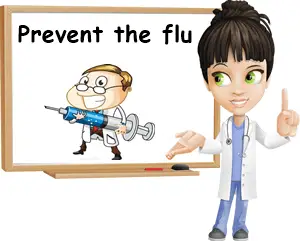The low temperatures, dry air and increase in time spent indoors make the flu a highly contagious respiratory infection during winter. Knowing how the flu virus works and is transmitted can help us take the necessary precautions to minimize exposure, reducing our chances of getting sick and prevent the virus spreading at least in the house and to other people. At the same time, it’s important to remember that learning how to prevent the flu may not always stop us from getting sick given the fact that, as adults, we have to go out in the world which automatically increases our chances of getting exposed to the virus.
But even if we do get sick, if we continue to focus on prevention, it can help us avoid severe symptoms and complications and get over the flu fast. So how do you prevent the flu? There are actually two very efficient ways of doing that:
1) Reducing exposure to flu viruses through avoidance and good hygiene.
2) Building up immunity naturally and through vaccinations.

In other words, we reduce our risks of coming into contact with the flu by avoiding contaminated objects and places, infected people that are likely to transmit it and practicing good hygiene to further prevent the virus from reaching us. The second aspect of preventing the flu is building up immunity against the virus naturally and through repeated vaccinations. For healthy people, a strong immune system is perfectly capable of clearing out the infection. However, anyone with existing respiratory conditions such as asthma may benefit more from vaccinations seen that even the slightest cough could trigger laryngospasms or other respiratory manifestations that could lead to an asthma attack or worse.
If possible, not getting to that point would be ideal for them, reducing their risks of serious outcomes. Because the flu is not just any respiratory infection, it’s one that produces fatalities every year and has the potential to produce pandemics, hence the need to best contain it and protect those with deficient immune systems or conditions that could suffer complications from it. Abiding by these 17 rules listed below not only helps prevent the flu naturally, by limiting exposure to the virus, but also helps prevent the flu from getting worse and spreading to others.

1) Vitamin C and zinc supplements
Despite a lot of experts being against them, studies show we actually need vitamin C and zinc as they actively contribute to our immune system. For example, T-cells and phagocytes accumulate vitamin C and use it to perform their functions within the immune system. Zinc is crucial for activating several different types of white blood cells and even a mild deficiency makes the immune system less efficient. Both nutrients are strong antimicrobial agents and hold important anti-inflammatory properties.
Supplementation will produce the most benefits when taken 2-3 weeks before the flu season starts until 2-3 weeks after the flu season ends. Taken while sick with the flu, vitamin C and zinc can help restore appetite and improve other symptoms, contributing to a faster recovery. There are also natural vitamin C supplements made from acerola cherries or rosa canina (dog rose). I usually take 1 g (1000 mg) of vitamin C and 10 mg of zinc continuously throughout the year and rarely get the flu despite being in contact with sick people. And when I do catch a virus, I only experience very mild aches for a day, then I’m my usual, energetic self.
2) B vitamins, especially B9 and B12
All B vitamins are vital because they support energy metabolism and help combat symptoms like malaise and fatigue. But vitamins B9 and B12 are of particular importance because they help in the production of red blood cells which transport oxygen to muscles and thus contribute to a feeling of vitality, preventing muscle weakness and even fainting due to the flu. Aside from meat, eggs and fish are great sources of B vitamins, especially vitamin B9 and B12 (see fish page and eggs page).
3) Iron and vitamin C for anemia sufferers
Anemia sufferers are a category most at risk for flu complications. Eating foods rich in iron such as meat, fish and eggs and taking vitamin C supplements to help absorb the iron can help prevent severe symptoms and complications from the flu. And did you know that the flu virus cannot infect red blood cells? This is because red blood cells do not a nucleus for the virus to feed its genetic material to and replicate.
4) Protein for a strong immune system response
Not eating protein impairs the immune function, increasing risks for infection, complications and fatalities. Studies show 20 different proteins are involved in the process of recognizing pathogens and work as antibodies for the immune system. As such, meeting your daily requirements of protein enhances the immune system response and boosts your resistance to infection. This is also one of the reasons why chicken soup is good for colds and flu.
5) Vitamin D
Sun exposure during spring and summer can help reduce the risk of getting sick with the flu in the cold season. This is because sun exposure helps make vitamin D, a key element for a strong immune system response.
6) Vitamin A
Chicken liver, orange fruits and vegetables are some of the best sources of vitamin A, a nutrient with a strong impact on the immune system. Getting enough vitamin A maintains healthy mucous membranes at the level of the nose and mouth as well as helps them regenerate following damage from respiratory infections. The nutrient enhances the activity of multiple immune system elements that actively fight infection, with potential benefits for influenza prevention.
7) Flu vaccine
The flu vaccine remains one of the best prevention methods for the flu. Those most at risk for flu complications, who can also have the vaccine include diabetics, people suffering from anemia, heart disease, children and the elderly as well as anyone with asthma or chronic lung disease. They are also those who will benefit the most from the flu vaccine because they should, at most, develop a light form of flu, with mild symptoms that will not in any way worsen their conditions.
8) Sleep and rest, avoid stress
Sleep deprivation, exhaustion and stress are bad for the immune system because they essentially lower our defenses against viruses, bacteria and disease in general. As long as you get enough sleep, do not work yourself to exhaustion and learn to manage stress, you have lower risks of catching the flu and developing a severe form. Below is a great video showing how our cells fight viruses such as influenza viruses.
9) Wash your hands
One of the best precautions against the flu is washing your hands. If you’ve touched contaminated objects like a doorknob, coins or bills, influenza viruses can transfer onto your hands and produce infection as soon as you eat, touch your nose or mouth or scratch your eyes. Experts recommend washing your hands for at least 20-30 seconds and using a liquid soap so as to prevent virus transfer from soap bars. If you are on the go, a good alternative is an alcohol-based hand sanitizer or simply rubbing alcohol.
10) Avoid crowded places
You can’t get sick with the flu if you are not exposed to the virus. The reason why flu season peaks in winter is because most people are together in closed spaces where direct transmission of influenza viruses occurs more easily. But whether indoors or outside, preventing the flu has a lot to do with avoiding crowded places where there are large gatherings such as the mall, cafes, crowded restaurants or canteens, buses, trains, the subway etc.
11) Don’t share personal objects
While the flu is easiest to catch from a sneeze or someone coughing in your direction, it can also be caught from sharing personal objects such as toothbrushes, towels, scarves, drinking or eating after someone sick with the flu etc.
12) Disinfect surfaces
This is especially useful to contain infection within the house, but also represents a great way to prevent the flu in general. If you have small children, a flu outbreak could go on for a great deal of time unless you disinfect everything to minimize exposure to the virus. Bleach is usually the most efficient for most hard surfaces (floors or kitchen counters), while soft surfaces like bed linen, pillow cases, towels and others should be washed at 90 degrees Celsius. For surfaces cleaned with bleach, it’s important to leave the window open for an hour to refresh the air in the room.
13) Avoid low temperatures
Going out in the cold can lower your immune system defenses and make it easier to become sick with the flu. Because we can’t stay indoors all winter, we should try to limit time spent in low temperatures and cover well, preferably dress in layers and wear a wool hat and a large scarf to keep your neck warm and prevent you from breathing in cold air or sneeze droplets with flu viruses. At home, make sure it’s warm enough.
14) Stay hydrated and eat well
Keeping hydrated and eating well are good advice not only for when you have the flu, but also for when you don’t want to get sick. This is because good nutrition is the basis of a strong immune system and can help prevent getting the flu.
15) Avoid sick people
If someone close to you has the flu but doesn’t require your help to take care of themselves, then it would be ideal to refrain from seeing each other at least for the duration of the flu: 7-10 days. Parents do this with children all the time: they keep them home from day care or school and until they are well again so as to not pass the flu to other children. And it works with adults too. If possible, everyone with the flu should take a few days off work.
v16) Avoid smoking, caffeine and caffeinated beverages
Studies show smoking affects respiratory tract health and has suppressing effects on the immune system. As such, smokers are more likely to get sick with the flu. Caffeine and caffeinated beverages dehydrate and promote nutritional deficiencies. If you have too much coffee, it could increase your chances of getting the flu.
17) Other advice for preventing the flu
If you want to prevent getting the flu, remember to cover your mouth and nose with your hand, a scarf or a tissue and close your eyes when someone is sneezing or coughing in your direction and, if possible, turn around. This alone could prevent a lot of flu cases. Also, try to avoid touching your face with your hands, unless you’ve just washed them and haven’t touched objects others have. Disinfect your phone with alcohol-based sanitizing tissues frequently during flu season. Avoid drinking or refilling your water bottle from water fountains. Do not go to bed with clothes you’ve been outside in and change scarves and hats frequently during flu season as so many people tend to sneeze or cough on them.
